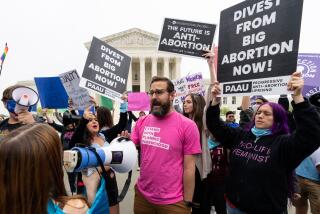Abortion Clinic Protest Rules Face Review
- Share via
WASHINGTON — The Supreme Court, taking up an appeal from militant antiabortion activists, said Monday it will decide whether medical clinics can use the federal racketeering law against protesters who conspire to shut down businesses that perform abortions.
The case, to be heard in the fall, does not concern the right to demonstrate peacefully. The justices turned away Operation Rescue’s claim that its clinic invasions were protected as free speech under the 1st Amendment.
However, the court agreed to hear the claim that abortion opponents did not use the kind of force and threats that would constitute racketeering activity.
At issue again is the reach of the Racketeer Influenced and Corrupt Organizations Act of 1970, better known as RICO.
Congress passed this broadly worded measure as a weapon against organized crime. Mobsters who preyed on legitimate businesses could be prosecuted in federal court or sued by private lawyers. Violators could be ordered to stay away from these businesses and forced to pay for losses they caused.
But the law was used widely during the 1980s, and the Supreme Court has said it extends well beyond mob cases.
In their latest appeal, however, lawyers for Operation Rescue argue that RICO does not apply to its activists because they were not seeking to “obtain property” through the use of force and threats, citing a clause from the federal “extortion” law.
RICO is unusual in that it incorporates many other laws. For example, an arsonist could be charged with violating arson law, and a “pattern” of violations could trigger a RICO case as well.
Lawyers for the National Organization for Women brought a civil RICO suit against Operation Rescue and alleged that the group had engaged in a national campaign of violence and intimidation targeting health clinics that performed abortions.
Their lawsuit cited dozens of incidents: In Chico, Calif., clinic staff members were shoved against a glass door and injured. In Pensacola, Fla., several staff members were pushed down stairs, their offices were trashed and their medical equipment damaged. In Los Angeles, a patient who had undergone surgery was hit over the head with a sign and left bleeding on the sidewalk.
The suit said the antiabortion leaders who were behind these incidents violated the anti-extortion statute known as the Hobbs Act. This measure makes it a federal offense to “obstruct commerce” or “obtain property” through the “wrongful use of actual or threatened force, violence or fear.” Repeated violations of the Hobbs Act make for a “pattern of racketeering activity” that comes under RICO.
But in the appeal, lawyers for Operation Rescue argued its members did not violate the Hobbs Act because they did not obtain property.
The decision to hear the appeal was unexpected, since the justices rejected a similar claim arising from the same case eight years ago.
At one point, a U.S. appeals court in Chicago threw out NOW’s suit on the grounds that Operation Rescue was acting for moral reasons, not an “economic motive.” Unlike mobsters, they were not seeking money from the businesses they targeted, the court said.
But the Supreme Court in 1994 unanimously reversed that ruling and cleared the way for the suit to proceed. Chief Justice William H. Rehnquist said at the time that RICO covers a “pattern of racketeering activity” such as robbery, murder and assaults, but it does not require that money be the motivation.
The case went to trial in Chicago, and NOW prevailed. A jury found dozens of examples in which the protesters used force, human blockades and violence against clinics. The plaintiffs were awarded $258,000 in damages, and the trial judge issued a nationwide order that forbids the protesters from trespassing at clinics, damaging property or interfering with their operation for 10 years. Violators can be charged with a crime.
“The injunction has been enormously effective in stopping clinic violence,” said Fay Clayton, the Chicago lawyer who represents NOW.
The U.S. Court of Appeals in Chicago also upheld the injunction and the damages verdict last year. But lawyers for antiabortion activist Joseph Scheidler and Operation Rescue appealed to the high court.
The court granted both appeals Monday. Scheidler vs. NOW, 01-1118, and Operation Rescue vs. NOW, 01-1119. The move suggests the justices, or at least some of them, are interested in reconsidering the broad use of RICO.
Jay Sekulow, who represents Operation Rescue, said he was heartened. “A federal statute designed for drug dealers and organized crime has been misapplied to silence the pro-life message.”
More to Read
Get the L.A. Times Politics newsletter
Deeply reported insights into legislation, politics and policy from Sacramento, Washington and beyond. In your inbox three times per week.
You may occasionally receive promotional content from the Los Angeles Times.











